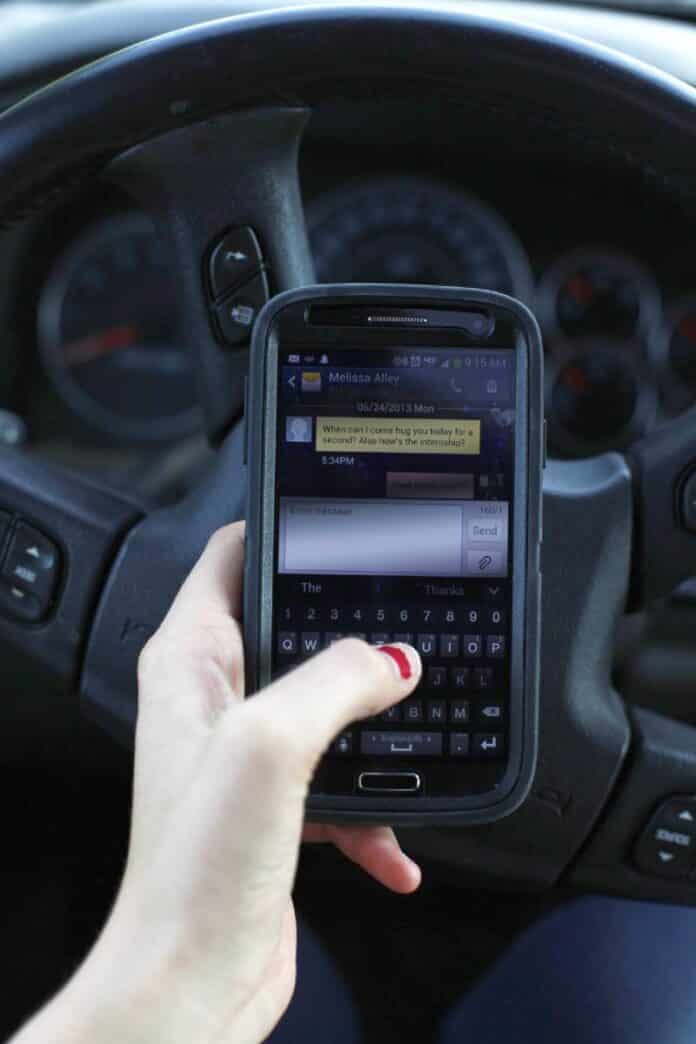
Indiana joins 23 other states Wednesday in prohibiting drivers from holding a cellphone while operating a vehicle. Violations are a Class C infraction with fines of up to $500.
However, cellphone use by motorists will remain legal if hands-free technology, such as Bluetooth or a cradle, is utilized. There is also no infraction if the driver is calling 911 to report an emergency.
Distracted driving has become a growing concern — especially in regard to young and inexperienced drivers. Indiana began graduated licensing laws in 2009 requiring new drivers to have 50 hours of supervised driving hours, including 10 hours at night. New drivers are restricted from late night driving, having passengers, and operating wireless electronic devices for about six months after receiving their license.
But it’s not just young people who are easily distracted, Bartholomew County Sheriff’s road division commander Capt. Dave Steinkoenig said. It’s also adults who believe their experience gives them an ability to multi-task while driving, he said.
“There are grown adults out there who are just as bad, if not worse, than teenagers,” Steinkoenig said.
Texting behind the wheel is widely considered the most dangerous form of distracted driving — something that has been illegal in Indiana since July, 2011.
But the law is very difficult to enforce because it’s almost impossible to prove in court that someone was texting while driving, Columbus Police spokesman Lt. Matt Harris said.
“You can see someone with the phone in their hand, and might assume they are texting,” Steinkoenig said. “But in reality, they could have been dialing a phone number.”
However the new law is very simple and easier to enforce, Steinkoenig said.
“With the exception of making an emergency call, the cell phone should not be in a driver’s hand,” Steinkoenig said.
The Indiana Criminal Justice Institute reports that every year since 2015, there are more than 1,200 collisions on Indiana roads where a cellphone or other electronic device was a factor, which results in an average of 40 total fatalities.
As more Hoosiers become aware of the new law, there is the question of how aggressively each law enforcement agency will enforce it.
Local law enforcement will be more prepared to answer that question after receiving a legal update from the office of Bartholomew County Prosecutor Bill Nash, Harris said.
“But I can say officers on Day One aren’t going to be going out, stopping every car under the sun and writing tickets for this,” Harris said. “Our officers prefer to use common sense. They want to educate the public, rather than punish them.”
The new law has not received a substantial amount of public attention, so state officials say motorists ticketed before July 1, 2021, will not receive points on their license, which can lead to license suspension.
Law enforcement has discretion whether to write a citation or issue a warning, depending on the circumstances of the case, Steinkoenig said.
But if a deputy pulls up to a stoplight while not on an emergency call, and sees a driver talking on a cellphone, “I would expect the deputy to pull that driver over, and at least have a conversation with him,” the road division commander said.
Accidents caused by distractions are increasing every year, Steinkoenig said. But there are many types of diversions that have nothing to do with texting or phone calls, he said.
For example, while many newer-model vehicles have state-of-the-art features that often fascinate motorists, operating that technology can easily become a distraction, which Steinkoenig defines as anything that takes your eyes off the road or your hands off the steering wheel.
Other diversions seen daily by officers in Bartholomew County include loud music, putting on makeup, eating food, watching a movie, playing video games and even reading a book, Harris and Steinkoenig said.
“If your mind is somewhere else and the vehicle ahead of you stops suddenly, or someone runs out in front of you, a tragedy could occur,” Harris said.
A Bartholomew County resident who says he’s “tickled pink” over passage of the new law is former State Rep. Milo Smith of Columbus, who served 12 years until retiring from the General Assembly at the end of 2018.
It was in 2011 that Smith first introduce a bill requiring all drivers to use hands-free electronic communication devices, Smith said. When his bill met resistance in the Senate, a compromise was reached that made texting while driving illegal, he said.
But Smith didn’t feel the texting law was enough. He attempted to get his original bill through the General Assembly several times in subsequent years, including each of his final three years in office, Smith said.
“It always got through committees and the House, but the Senate would put the brakes on it,” Smith said. “Many senators who routinely used their cellphones while driving told me they didn’t want Big Brother looking over their shoulders.”
It wasn’t until last winter that House Bill 1070, authored by State Rep. Holli Sullivan, R-Evansville, breezed through the House of Representatives and Senate. The votes were taken after several Hoosiers packed into hearing rooms to share how their lives have been forever changed by distracted driving collisions. The bill was signed March 18 by Indiana Gov. Eric Holcomb.
[sc:pullout-title pullout-title=”For more information” ][sc:pullout-text-begin]
For more information about the new law, visit HandsFreeIndiana.com.
Hands Free Indiana is a partnership between the Indiana Department of Transportation, Indiana State Police, Indiana Criminal Justice Institute, Indiana Bureau of Motor Vehicles, Indiana Constructors Inc., Indiana Motor Truck Association and ACEC Indiana.
[sc:pullout-text-end][sc:pullout-title pullout-title=”The new law” ][sc:pullout-text-begin]
Indiana Code 9-21-8-59 now states drivers on Indiana roads will be prohibited from having a mobile device in their hands while their vehicles are moving, with the exception of dialing 911 in an emergency. The law permits the use of voice-operated or hands-free technology such as speakerphone, Bluetooth or headset.
[sc:pullout-text-end]




